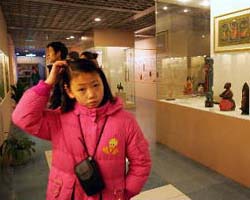
China's first private sex museum in Shanghai has sparked a row
over plans to encourage admission to young people and public
statements on sex education for children.
The sex museum, a museum owned by Liu Dalin, a leading sexual
culture scholar in China, displays sex-related historical artifacts
dating from primitive times.
Tickets for the museum state that minors are only admitted if
accompanied by a parent, but Liu plans to attract more young people
by cutting the admission price by half.
"Sex education for young people is better than no sex
education," Liu said.
Sex education should begin in childhood, and should not be
overlooked, he said, pointing to a China Family Planning
Association survey showing that premarital sex, premarital
pregnancy and abortions are all on the rise.
A survey by the Social Survey Institute of China in the national
capital Beijing showed that 87 percent of students in five cities
turned to their parents for advice and information on sex.
But many parents, influenced by traditional conservative ideas,
were incapable of offering adequate information as their own sex
education was inadequate, said museum owner Liu.
"Children are reaching puberty at a younger age these days, but
sex education is lagging far behind," said Xi Xiaoping,
vice-president of the China Family Planning Association.
With more than 400 displays, reflecting such topics as "sex and
the arts", "marriage and women", and "sex in daily life", the
museum was an education center for youngsters, dispelling the
mysteries of sex, he acknowledged.
The museum, which opened a year ago, has previously heeded
public sentiment, and never stated publicly that youngsters are
welcome to exhibitions.
"Historically, sex was seldom publicly discussed as it is
traditionally regarded as a taboo in China," said Hu Hongxia,
executive curator of the museum.
The purpose of the museum was to do away with public prejudice
and ignorance and to educate the public on sexual culture," she
said.
Modern kids and youngsters had many channels to learn about sex,
especially on the Internet, but most of the content on the Internet
was unsuitable for the healthy maturing and development of young
people, said Hu.
However, parents and teachers have lined up to oppose opening
the museum to minors.
Zhang Genxing, a middle school teacher in Shanghai, worried the
museum might mislead youngsters as most of the exhibits simply
illustrated sexual techniques without the moral and psychological
aspects.
"It is not necessary for young people to know so much about the
history of sex," Zhang said. "This could adversely affect their
behavior."
A university student surnamed Cai approved of the exhibitions,
but she thought the museum more suitable for college students.
"If I had come when I was a middle school student, I would not
have understood all of this," she said.
(Xinhua News Agency April 15, 2006)

